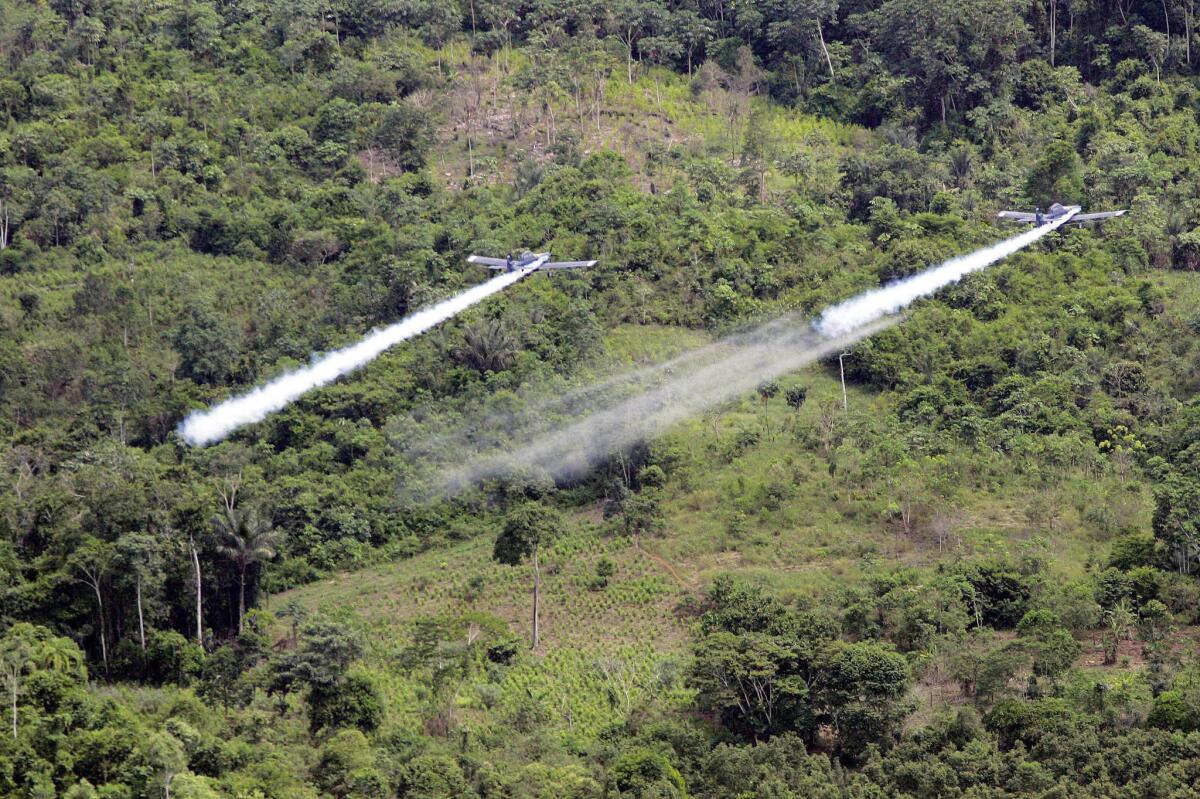U.S accepts Colombia’s decision to suspend use of weed killer

Two planes are seen fumigating coca fields in San Miguel, Colombia, in this December 2006 file photo.
- Share via
Reporting from Bogota, Colombia — The U.S. ambassador to Colombia said Monday he accepted the country’s decision to suspend a longstanding program of aerial spraying of weed killer on coca crops but that other tools will be used to try to contain farming of coca, the base material of cocaine.
The spraying of glyphosate by crop-dusters flown mainly by civilian U.S. pilots has been a linchpin of U.S. drug-control policy in Colombia for two decades. Critics question the program for potential health risks to farmers, and some drug-policy analysts say spraying merely pushes coca farming to other countries.
------------
FOR THE RECORD
Weed killer: An article in the May 12 Section A about Colombia suspending the spraying of weed killer on coca crops said the herbicide glyphosate was known by the trade name Roundup. Glyphosate is an ingredient in Roundup and other weed killers. Also, the article referred to glyphosate as a chemical made by Monsanto. Monsanto originally patented glyphosate, but it is now made by many manufacturers.
------------
In a public appearance in Manizales, Ambassador Kevin Whitaker said the U.S. will respect President Juan Manuel Santos’ decision to stop the controversial program at least temporarily over concerns that glyphosate, known by the trade name Roundup, poses a health risk.
Health minister Alejandro Gaviria this month recommended stopping the use of the weed killer, saying the chemical made by Monsanto may cause cancer. The St. Louis-based manufacturer denies the chemical poses a health risk if applied correctly.
While acknowledging that the decision to halt the U.S.-financed program “is Colombia’s to make,” Whitaker indicated the U.S. would not abandon efforts to curb Colombian production of the leaf, which is grown mainly in rural, jungle and mountainous areas.
“Colombia and the United States have developed a number of approaches as part of a comprehensive effort to confront narcotrafficking,” Whitaker said.
Whitaker gave no indication whether the U.S. would boost other coca-reduction methods such as alternative crops and manual eradication by workers uprooting coca plants. Manual eradication has declined in recent years partly because of deaths and injuries that eradication teams suffered from snipers and landmines.
In announcing the suspension Saturday, Santos also said spraying’s effectiveness was debatable. Recent figures from the White House Office on National Drug Control Policy showed Colombian coca cultivation in 2014 grew to 280,000 acres, up 40% from the previous year. U.S. officials blamed the increase on higher cultivation in restricted areas including indigenous reservations and national parks.
Vanda Felbab-Brown a fellow who specializes in global security issues at the Brookings Institution in Washington, said Colombia’s decision “is the right one.”
“Aerial spraying is politically controversial, costly and causes a tremendous amount of counterproductive side effects such as destroying legal crops, negative environmental effects as the chemical washes into streams, and alienating coca farmers from government authorities,” Felbab-Brown said.
The government’s decision may also have been influenced by peace talks underway in Havana with the Revolutionary Armed Forces of Colombia, a rebel group known by its Spanish initials, FARC. No final peace deal has been signed, but rebels have agreed to end their involvement in cocaine trafficking and to help in de-mining efforts in coca fields and elsewhere.
University of Miami international relations professor and Colombia expert Bruce Bagley said the Santos government had little choice but to halt spraying after studies showed “inescapable” evidence of negative health consequences.
“Santos’ decision is both scientifically and environmentally appropriate and may well aid progress in the peace talks with the FARC,” Bagley said. “The U.S. has dissented, but not very stridently, so this decision is a win-win for Santos.”
Kraul is a special correspondent.
More to Read
Sign up for Essential California
The most important California stories and recommendations in your inbox every morning.
You may occasionally receive promotional content from the Los Angeles Times.











